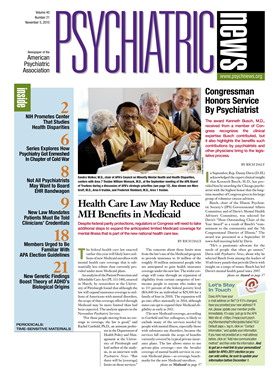Psychiatrists should ask their patients about their sex lives, psychiatrist Pierre Assalian, M.D, an expert on sexual medicine, emphasized at the annual meeting of the Canadian Psychiatric Association in Toronto in September. Assalian is an associate professor of psychiatry at McGill University and was president of the 17th World Congress of Sexology.
One reason psychiatrists should focus on sexual issues, he explained, is because depression, bipolar disorder, schizophrenia—indeed, any psychiatric illness—can impair sexual response, and when patients' sexual responses are impaired, it can cause them additional and substantial distress. For example, a study reported in the November 2009 Journal of Sexual Medicine found that people with bipolar disorder who were experiencing sexual dysfunction were more suicidal than those not experiencing sexual problems.
Another reason psychiatrists should inquire about the sex lives of their patients, Assalian pointed out, is because antidepressant use can interfere with orgasm. Seventy percent of patients using antidepressants have been found to experience this problem. Antipsychotics can also prevent orgasm, and when either antidepressants or antipsychotics do so, it may prompt patients to stop taking their medications.
True, “many patients, and clinicians, may not be comfortable discussing sexual issues during a typical office visit,” Assalian conceded. Nonetheless, the subject should be broached, and psychiatrists can then take steps to help patients in this regard.
For example, some antidepressants are more likely to prevent orgasm than others, he said. Sertraline has been reported to be the least likely to do so and paroxetine the most. Generally the second-generation antipsychotics are less likely to prevent orgasm than the first-generation drugs. Thus, changing medication type may be one answer to restoring orgasm.
When an antidepressant hinders orgasm, another method sometimes recommended for dealing with the problem is to take a “drug holiday,” that is, to stop taking the medication for a few days before intercourse and then resume it after intercourse, Assalian noted. He does not, however, recommend this strategy. “It may help the patient's sexual problem,” he explained, “but it gives a double message to the patient. On the one hand, we say, ‘Do not stop the antidepressant,’ but on the other hand, we say, ‘You can stop it for a couple of days so you can have sex.’ This is a bad strategy. The patient may go into a discontinuation syndrome because he discontinued the medication abruptly.”
Thus a more judicious means of dealing with the problem, he believes, is to add certain medications to an antidepressant that can increase sexual response, such as bupropion or methylphenidate, which he refers to as “sexatives.”
In addition to helping patients whose sexual problems are related to psychiatric illnesses or to the use of psychotropic medications, psychiatrists can also assist patients with sexual problems due to other causes, Assalian said, because psychiatrists have the ideal combination of being both physicians and experts on the psyche.
Take, for instance, lack of sexual desire in women, he said. Such women may fear too much intimacy, of being fused with another person. Psychiatrists are thus the ideal clinicians to help these women. Moreover, couples therapy often has a better prognosis for helping women with this condition than individual therapy does.
Psychiatrist Gail Knudson, M.D., a clinical associate professor of sexual medicine at the University of British Columbia, cited other means by which psychiatrists can aid women with sexual problems.
For example, while psychotherapy is generally effective for female desire or arousal problems, some medications can also be useful. Estrogen, for example, can benefit postmenopausal women, and sildenafil may benefit women with multiple sclerosis or spinal-cord injury who have problems with sexual functioning.
If women have trouble achieving orgasm, cognitive-behavioral therapy (CBT) can help them explore their genitalia and learn how to masturbate, Knudson noted. Women who experience pain during intercourse can also profit from CBT. And when CBT is combined with the use of vaginal dilators and pelvic physiotherapy, the treatment success rate for vaginismus is high.
“In any event, when you evaluate women for sexual dysfunction, it is important to consider all of the female sexual disorders listed in
DSM-IV-TR because they often overlap,” Knudson stressed, noting that desire and arousal difficulties are especially intertwined.

